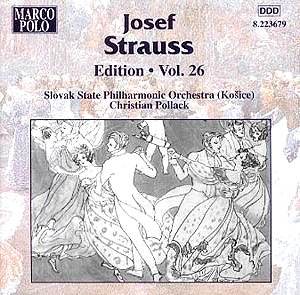Recent releases from Marco Polo seem to take the world
of the Viennese waltz very seriously. Josef Strauss was overshadowed
by his elder brother Johann Strauss the younger, partly because of being
dogged by ill health. Yet his output was considerable and judging from
the catalogue entries under-recorded.
Josef Strauss like his brother would have been
taught harmony and musical style by his father the celebrated Johann
Strauss whose reputation spread through court circles from country to
country like wildfire. Like his brother he concentrated on writing for
the more lucrative ballroom dances. Unlike his brother, Josef's output
did not venture into music different from his waltzes, polkas and quadrilles.
His compositions, as judged by these CDs, are more mellow and not as
robust as those of Johann Strauss. A finer degree of orchestration is
detected which makes me think he could have written good operettas.
Apart from his illness maybe the smaller output is also due to the extra
care taken in composing. The Johanns turned their dances out like hot
cakes with original melodies, yet with stock orchestration.
Josef Strauss is best known for his most popular waltzes
like Music of the Spheres and Village Swallows (Marco
Polo 8.223619) and popular polkas like Without a Care (Marco
Polo 8.223563). This does not mean to say that the less popular are
in any way inferior and those on these CDs are equally charming. To
me the less robust texture of this brother is very pleasing.
Vol 25: Try The Wind's Bride polka
[tk.1] and La Soubrette polka [tk.11] with its staccato
choppiness. It is highly reminiscent of the Tritsch-Tratsch polka
(Johann) and must have provided the framework for inspiration. The Hesperus
Ball waltz is highly original and was written for a ball where
the three Strauss brothers would each dedicate a piece each year. In
this it is clear that Josef wanted to show that he could write as equally
good a piece as the others, and one that would stand apart. It is quite
delightful. Another of the highlights of the disc is the Faust
quadrille [tk.6], which demonstrates how Gounod's music can
be expertly adapted to the ballroom. Despite this Josef sadly makes
no attempt to link the medley's individual sections.
Vol 26: The numbers on this disc are more robust
than those found in the previous volume. Of particular interest is the
energetic Tarantela polka (Tarantella misspelt?) [tk.2],
written amongst his first batch of dances in 1855. Another engaging
one is the romantic Siskins waltz [tk.5] with its haunting
opening before flowing into a waltz of orthodox treatment. The CD rounds
off with an extended piece, a pot-pourri of national Austrian songs
and dances.
This again shows Josef's inability to link tunes with
an easy transition that retains the flow.
Under Christian Pollack’s direction the performance
are good. There seems to be some absence of vitality in Vol. 25; not
an issue for Vol.26. I cannot make up my mind whether this is due to
some lethargy in the playing under Dittrich in Vol. 25, or to improved
microphone placing giving better presence in Pollack's Vol. 26 which
was recorded just one month later. The same orchestra sounds very different.
The notes, written in English, German and French give
detailed background to the numbers, but carry no section on the background
of this lesser known member of the Strauss family.
Those who enjoy the atmosphere of the Vienna New Year’s
Day broadcasts will enjoy these volumes. Volume 25 contains the better
and more varied pieces whilst Volume 26 provides better performances.
Raymond Walker

